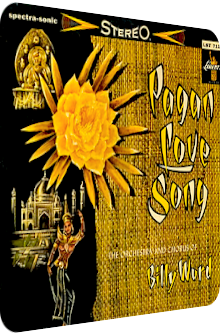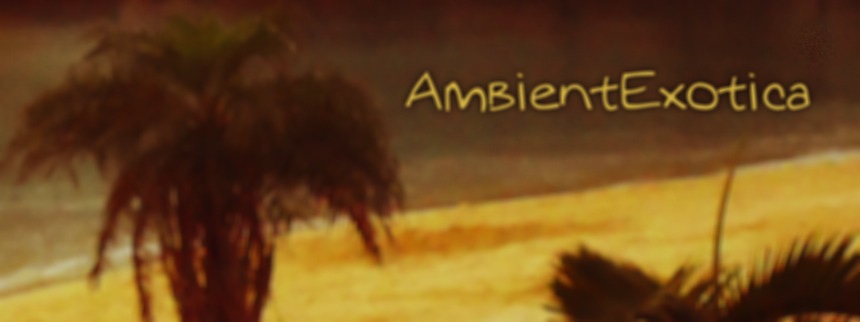
Billy Ward
Pagan Love Song
1959
Pagan Love Song is a vocal Exotica album of 12 tracks presented and sung by William E. Ward aka Billy Ward (1921–2002), released in 1959 on the New York-based label Liberty Records and featuring an orchestra with a choir. This first sentence could already give you a convenient overview of the album’s production values; except that it is not true. Or to be more precise: you would miss out on a lot of interesting background information… and back-stabbing. First of all, Billy Ward’s fame is largely based on his R&B collective Billy Ward And His Dominoes.
Oddly enough, His Dominoes do not seem to play any role on this album, for they are neither mentioned on the front artwork, nor in the liner notes. But most of Ward's band mates are on board alright! Many a tune does not even feature one single note sung by Ward, as he is clearly replaced by his fellows and other singers, despite their names being completely unmentioned. Another interesting tidbit comes in the shape of said chorus which is well-known to Exotica fans, as it turns out to be the Jack Halloran Singers who already enchanted Martin Denny’s Far East-inspired Hypnotique (1958) a few months prior to Pagan Love Song. Since both albums are released on Liberty Records, it was presumably easy to get hold of the Jack Halloran Singers time and again.
With the appearance of the Dominoes crew and the talented singers set in stone, there is a third boon which lets this album tower above the competition: the orchestra. Even though it is not overly well-equipped or exotic, with strings, flutes and a piano making up the majority of the arrangements, there is the occasional appearance of bongo layers and ukulele twangs. But it gets better still, for the helical string movements are delicately wide, emit Space-Age timbres and cavalcades of colors. The spheroidal flute tones are equally insouciant. Even the Hawaiian material only uses its humble Hapa Haole vestiges as the base frame which is then ameliorated by auroral strings. The arrangements really are top notch, and while I do not agree with every choice and cheesy addition, the magnitude or scope of the production is convincing.
Best of all: there is almost always a new trick injected in each arrangement, be it the appearance of a new lead singer, the presentation of a previously unheard instrument or the fact that three unique songs are on board, one of them an outright megalomaniac but ultimately lost classic that was never meant to be! In the following paragraphs, I dissect Pagan Love Song and tell you why it is one of the greatest vocal Exotica albums despite its messy back story.
The eponymous Pagan Love Song by Arthur Freed and Nacio Herb Brown kicks off the album. True, Exotica listeners rarely face the lyrical portions of this gold standard, but this rendition should not bewilder anyone who knows big names such as Alfred Apaka or Hal Aloma. Billy Ward’s baritone voice leads the Jack Halloran Singers in an eminently smarmy arrangement with short bursts of Space-Age strings and a general mellifluousness. Exotic percussion, however, only turns up for the first time in Frederick Hollander’s and Leo Robin‘s Moonlight And Shadows which surprises right from the get-go with hollow bongo blebs and a wondrously mystical Far Eastern prelude which then presents the susurrant mixed choir in the back. Billy Ward is amiss and replaced by Eddie Herring who sings in the highest regions he can possibly reach. Harp twangs and pleasantly oscillating strings in tandem with Pagan flute tones round off the nocturnal landscape.
Charles Tobias’ and Cliff Friend’s Trade Winds takes the cake in terms of catchiness and embellishments: midtempo rhythms, Ward’s glorious return and unveiling of many baritone regions, enormously wadded string underbrushes and the doo-dooing male choir work well together, even the instrumental segues do not feel forced but are well integrated. Fans of that certain Space-Age thickness are clearly targeted.
The rendition of R. Alex Anderson’s I’ll Weave A Lei Of Stars For You seems like a mere afterthought to Trade Winds due to the same trombone-accentuated rhythm, but on this piece Eddie Herring reappears as the lead vocalist. The bustling liveliness and textural pool are even interpolated, with the gleaming horn-interspersed wall of strings shining in mauve-tinted technicolor. Lyrics such as “the moon so green of jealousy” even add contrastive spectrums to the scenery. Charlie Parker’s Bird Of Paradise is unfortunately a little letdown, and this is all the more unexpected when one contrasts the song’s main body with the superb Exotica anacrusis loaded with magical flutes and enchanting tone sequences. But as stated seconds ago, Bird Of Paradise is only a little letdown. The orchestra gongs are surprising, Ward’s toasting over the melting mixed choir is pseudo-witty, and the Space-Age “bong” (!) gibberish by the choir has that retro chic.
The final piece of side A is the histrionic and very turbulent Hurricane, envisioned by Billy Ward himself. It is the glorious wannabe-classic I have hinted at in the opening paragraph. This tune is absolutely crazy and splendid. Like a song about a superhero or respective villain, the hurricane part is unleashed via melodramatic lyrics, the strings spiral down, cascades of rain are simulated via falsetto foils, and the staccato of the lyrics rounds off this standout track. Side A ends with aural aurum!
Side B launches with another Wardism which is titled A Lei, A Candle And A Prayer, a prototypical Romantic ballad with all the ingredients you can possibly think of: smarmy backing vocals, oily lead parts, another dose of orchestra bells and high-rise strings. This is too chintzy for me. Leo Robin’s and Ralph Rainger’s Blue Hawaii is equally syrupy, but at least features aqueous flute flumes, “doo-doo” chants and the inclusion of a ukulele. “The night is young, and so are we” is still one of the greatest lyrical portions written for any song, so enjoy, dear adolescents. It is getting partially creepy with Ward’s last original concoction called Behave, Hula Girl, for you know how these girls of the late 50’s are, always up for trouble, right? Spare me! Anyway, Billy Ward teaches his girl in a ukulele-boosted, rather minimal arrangement. A piano is included, the strings are thinned out in this upper midtempo critter and surprise with a sugar-sweet pizzicato dessert, but that is about it.
While the traditional but gorgeously dreamy Magic Island features Monroe Powell as the lead and launches with twirling strings that lead to one of those stereotyped string-coated ballads, it is Milton Grayson’s time to shine on Charles E. King’s Hawaiian Wedding Song (Ke Kali Nei Au) that adds a new twist near the end of the album, namely a duet with a female Jack Halloran singer. Otherwise, it’s business as usual. Lydia Lili’uokalani’s mandatory Aloha Oe is the last song and features expectedly streamlined cliché plateaus with orchestra bells, choir murmurings en masse and abyssal “aloha-loha” backings. Meh.
Pagan Love Song is an exotic Pop album whose big budget is audible throughout each composition. The Jack Halloran Singers prove to be a splendid backing choir, and while their performance is much more whitewashed and common than on Martin Denny’s Hypnotique LP, it is the material that can be blamed for this. Notwithstanding this remark, the singers improve the record’s qualities via their onomatopoeic cocktail lounge and Space-Age syllables which form a wonderful contrast to the serious performances of the lead singers. And with that previous sentence, I have already implicitly mentioned the glaring flaw, the only stale aftertaste found on this album, even though it is only of importance to diehard fans of Billy Ward, I presume: the addition of one too many leads. Yes indeed, the more vocals and singers a vintage album features, the higher its budget is, and the better it can take a stand against the Easy Listening competition and all the hastily produced patchwork records of Hapa Haole tunes, played by session musicians in one single take in order to make room for the next LP to be recorded. The music industry, in a way, was as frantic and driven by cost-reducing decisions as it is today. The kaleidoscope of vocals is therefore questionable. I for one like diversity.
While the different tonal ranges add variety and elements of surprise to the table, this phenomenon leaves room for speculation. Much speculation even. Why is only Billy Ward boldly mentioned on the front artwork? Why is none of the additional singers and fellow band mates of Billy Ward And His Dominoes ever mentioned in the liner notes, even though they are clearly on board? As usual, I ask these questions decades too late, but whatever the primary reasons for this purposeful camouflage tactics may be, Exotica fans are in for a treat.
The clear standout track is the almighty Hurricane with its staccato maelstroms, over-the-top lyrics and whirling strings, whereas Bird Of Paradise and Moonlight And Shadows succeed with their convincing gallimaufry of dreamy textures; flute spirals and string washes conflate into a magnificent cocktail that is definitely not the primary goal or signature element of this album, but grafts a hugely exotic feeling onto the atmosphere. Add the bongo thicket of said Moonlight And Shadows to the roster, and you got a truthful Exotica hymn. Fans of vocal Exotica albums with a large Space-Age flavor should try to get hold of this album which is, for the time being, only available on vinyl, with a few of its songs appearing on compilations. Given Billy Ward’s former stardom, and since the album belongs to Martin Denny’s house label Liberty Records, a reissue should be close at hand, but probably isn't.
Further reading:
Without the inspiring detective work of Marv Goldberg, this review would have been far less accurate. Marv Goldberg’s R&B Notes feature a detailed overview of Billy Ward’s career, with one focus being the mess behind the curtains that affects Pagan Love Song. A highly enlightening reading!
Exotica Review 262: Billy Ward – Pagan Love Song (1959). Originally published on Sep. 21, 2013 at AmbientExotica.com.
